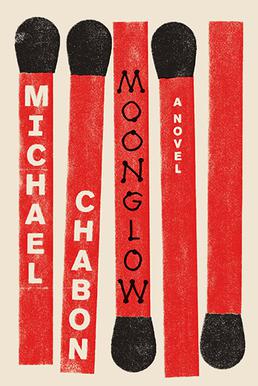In this
fictionalized memoir, Michael Chabon revisits the beginning of his writing
career and the end of his grandfather’s life. The dying man recounts his
childhood in Philadelphia, his lifelong interest in rocketry and space
exploration, his World War II service spent trying and failing to capture Nazi
scientist Wernher von Braun (who becomes something of an arch nemesis), his
troubled marriage to an unstable French refugee with a young daughter, his
stint in prison, and his late-life romance with a widowed painter.
There was
a time when Michael Chabon’s books were as purposefully plotted and paced as
they were stylistically evocative, but 2012’s meandering, self-indulgent
(though still colorful) Telegraph Avenue
put an end to that equilibrium. Moonglow,
with its overlapping plotlines and nonlinear treatment of time, does not
restore it, but it does strike other balances: between intimate family history
and world-altering events, between touchingly poignant sincerity and crassly
irreverent humor, and between tragedy and triumph.
As with
previous works, Chabon excels at bringing people and places to life. Though neither
grandparent is named, both emerge as complex, fully realized characters. The
grandfather’s capacity for violence is weighed against his commitment to family
and obsession with rocketry while the grandmother’s theatrical gifts mask a
tortured past. There is also a rakish, eye-patch wearing pool-hustling ex-rabbi
uncle for good measure. Though the narrative moves around a lot – back and
forth between Philadelphia, Europe, New Jersey, and Florida – each setting is
clearly and convincingly rendered (As a native of northern New Jersey, I got a
kick out of reading about the grandmother’s performances at the Paper Mill
Playhouse).
For all of
these virtues, Moonglow’s narrative
structure is nothing short of maddening. The three main plotlines – the grandparents’
love story, the grandfather’s war experiences, and the grandfather’s retirement
years – are constantly jockeying for the reader’s attention, and more often
than not, they interrupt rather than complement one another. Going from a
soldier’s haunting recollection of the horrors of war to a lurid description of
an old man’s sexual appetites to a child’s eye view of obscure card games
creates a kind of mood whiplash that does the novel a disservice. While this
digression-laden, fragmentary approach is not without purpose – it evokes the
way that Chabon himself probably heard some of these tales – Moonglow definitely could have
benefitted from a more conventional structure.
Moonglow is not quite a return to form, and
it falls short of both Chabon’s earlier works as well as the gold standard of
family sagas that is Jeffrey Eugenides’s Middlesex.
However, it is still a bold and touching blend of fact and fiction, one worth
cutting through the structural clutter to explore.
7.75/10

No comments:
Post a Comment